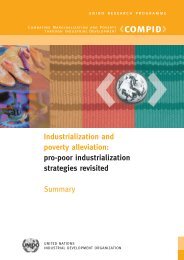Manual on the Development of Cleaner Production Policies ... - Unido
Manual on the Development of Cleaner Production Policies ... - Unido
Manual on the Development of Cleaner Production Policies ... - Unido
Create successful ePaper yourself
Turn your PDF publications into a flip-book with our unique Google optimized e-Paper software.
DEVELOPMENT OF CP POLICY<br />
MODULE 5: POLICY TOOLS AND INSTRUMENTS<br />
Envir<strong>on</strong>mental c<strong>on</strong>siderati<strong>on</strong>s at internati<strong>on</strong>al financing instituti<strong>on</strong>s<br />
The attitude <strong>of</strong> internati<strong>on</strong>al financing instituti<strong>on</strong>s (IFIs) towards <strong>the</strong> envir<strong>on</strong>ment has been changing<br />
since <strong>the</strong> beginning <strong>of</strong> <strong>the</strong> nineties. Most IFIs, such as <strong>the</strong> Asian <strong>Development</strong> Bank, European Bank<br />
for Rec<strong>on</strong>structi<strong>on</strong> and <strong>Development</strong>, Inter-American <strong>Development</strong> Bank, or <strong>the</strong> World Bank, have<br />
built str<strong>on</strong>g envir<strong>on</strong>mental appraisal procedures into <strong>the</strong>ir lending process. This was d<strong>on</strong>e partly as a<br />
result <strong>of</strong> some highly publicized projects that resulted in envir<strong>on</strong>mental and social damage (e.g. largescale<br />
dams, retenti<strong>on</strong> reservoirs, etc.) and partly thanks to a number <strong>of</strong> internati<strong>on</strong>al initiatives, starting<br />
with <strong>the</strong> Statement by Banks <strong>on</strong> <strong>the</strong> Envir<strong>on</strong>ment and Sustainable <strong>Development</strong>.<br />
EXAMPLE<br />
Statement by Banks <strong>on</strong> <strong>the</strong> Envir<strong>on</strong>ment and Sustainable <strong>Development</strong><br />
Protecting <strong>the</strong> envir<strong>on</strong>ment cannot be achieved by Governments al<strong>on</strong>e, and <strong>the</strong> private sector has a<br />
particular perspective <strong>on</strong> envir<strong>on</strong>mental issues. The finance sector could play a str<strong>on</strong>g role in<br />
promoting Sustainable <strong>Development</strong>, through its link with commercial activities, including some<br />
activities that damage <strong>the</strong> envir<strong>on</strong>ment. In preparati<strong>on</strong> for <strong>the</strong> 1992 Rio C<strong>on</strong>ference, <strong>the</strong> “Statement by<br />
Banks <strong>on</strong> <strong>the</strong> Envir<strong>on</strong>ment and Sustainable <strong>Development</strong>” was signed by some 30 banks, expressing<br />
<strong>the</strong>ir envir<strong>on</strong>mental commitment. The banking statement was revised in 1997, and took <strong>the</strong> form <strong>of</strong> a<br />
“Statement by financial instituti<strong>on</strong>s”. To date, 170 financial instituti<strong>on</strong>s worldwide, with more than<br />
500,000 employees, are signatories. In a separate development, a Statement <strong>of</strong> Envir<strong>on</strong>mental<br />
Commitment by <strong>the</strong> Insurance Industry was signed by 90 insurers and reinsurers, within a programme<br />
<strong>of</strong> cooperati<strong>on</strong> that has been in existence since 1996.<br />
The key comp<strong>on</strong>ent <strong>of</strong> both statements is a commitment to sustainable development and support for<br />
<strong>the</strong> precauti<strong>on</strong>ary approach to envir<strong>on</strong>mental management, which aims to prevent envir<strong>on</strong>mental<br />
damage. The signatories also undertake to promote public awareness and communicati<strong>on</strong>.<br />
Given <strong>the</strong> str<strong>on</strong>ger market positi<strong>on</strong> that enterprises are in a positi<strong>on</strong> to enjoy as a result <strong>of</strong> preventive<br />
envir<strong>on</strong>mental management, financing instituti<strong>on</strong>s could build envir<strong>on</strong>mental requirements into <strong>the</strong>ir<br />
credit evaluati<strong>on</strong>s <strong>of</strong> firms, and <strong>the</strong>reby include envir<strong>on</strong>mental aspects in <strong>the</strong> evaluati<strong>on</strong> <strong>of</strong> all lending.<br />
This is already being d<strong>on</strong>e at <strong>the</strong> European Bank for Rec<strong>on</strong>structi<strong>on</strong> and <strong>Development</strong> (EBRD), which<br />
requires its financial intermediaries (smaller nati<strong>on</strong>al banks, managing credit lines <strong>of</strong> EBRD for small<br />
projects in a given country) to carry out an envir<strong>on</strong>mental due diligence analysis before lending.<br />
Interestingly, this approach may represent a risk for certain enterprises that find <strong>the</strong>mselves unable to<br />
obtain loans.<br />
Most commercial banks, however, fail to c<strong>on</strong>sider envir<strong>on</strong>ment at all in loan appraisals, and <strong>the</strong> abovementi<strong>on</strong>ed<br />
statements have not been translated into a comm<strong>on</strong> practice <strong>of</strong> lending for CP projects.<br />
Wherever <strong>the</strong> envir<strong>on</strong>ment is taken into account, it is typically addressed using end-<strong>of</strong>-pipe<br />
technologies.<br />
PAGE 128
















